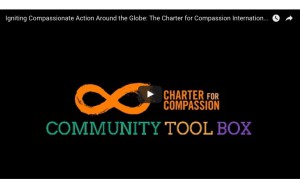.. DEMOCRATIC PARTICIPATION ..
Excerpts from the websites of International Peace Cities and Charter for Compassion
-
A compassionate city is an uncomfortable city! A city that is uncomfortable when anyone is homeless or hungry. Uncomfortable if every child isn’t loved and given rich opportunities to grow and thrive. Uncomfortable when as a community we don’t treat our neighbors as we would wish to be treated.”
~Karen Armstrong, Founder of the global movement, The Charter for Compassion
Charter for Compassion International and International Cities of Peace are now working together. In coordination, the organizations wil help you self-define and get to work in making your neighborhood, city, or state a more compassionate place for all citizens to thrive.

Video: Charter of Compassion Toolbox
The Compassionate network has an amazing Tool Box to help you get a baseline of needs, then create an action plan for progress. Every Compassionate City, due to their current work, will be added to our City of Peace network upon request. Every City of Peace can have direct access to the Charter for Compassion’s director, Marilyn Turkovich, and their Tool Box. Get in touch and start the good work of compassion. For details, send an email to info@internationalcitiesofpeace.org
The Charter TOOL BOX is a four-part model or framework for building a Compassionate Community. Every city of peace would benefit from this: How to Assess, Commit, Launch, and Sustain your compassionate action plan.
The principle of compassion lies at the heart of all religious, ethical and spiritual traditions, calling us always to treat all others as we wish to be treated ourselves. Compassion impels us to work tirelessly to alleviate the suffering of our fellow creatures, to dethrone ourselves from the centre of our world and put another there, and to honour the inviolable sanctity of every single human being, treating everybody, without exception, with absolute justice, equity and respect.
(Continued in right column)
How can culture of peace be developed at the municipal level?
(Continued from left column)
It is also necessary in both public and private life to refrain consistently and empathically from inflicting pain. To act or speak violently out of spite, chauvinism, or self-interest, to impoverish, exploit or deny basic rights to anybody, and to incite hatred by denigrating others—even our enemies—is a denial of our common humanity. We acknowledge that we have failed to live compassionately and that some have even increased the sum of human misery in the name of religion.
We therefore call upon all men and women to restore compassion to the centre of morality and religion ~ to return to the ancient principle that any interpretation of scripture that breeds violence, hatred or disdain is illegitimate ~ to ensure that youth are given accurate and respectful information about other traditions, religions and cultures ~ to encourage a positive appreciation of cultural and religious diversity ~ to cultivate an informed empathy with the suffering of all human beings—even those regarded as enemies.
We urgently need to make compassion a clear, luminous and dynamic force in our polarized world. Rooted in a principled determination to transcend selfishness, compassion can break down political, dogmatic, ideological and religious boundaries. Born of our deep interdependence, compassion is essential to human relationships and to a fulfilled humanity. It is the path to enlightenment, and indispensable to the creation of a just economy and a peaceful global community.
Participating cities
Almost 70 cities [in 45 countries] globally have affirmed the Charter for Compassion through city, community councils or other govenment entities. Affirming the Charter means that a community has identified issues on which they are working, and committed to a multi-year action plan.